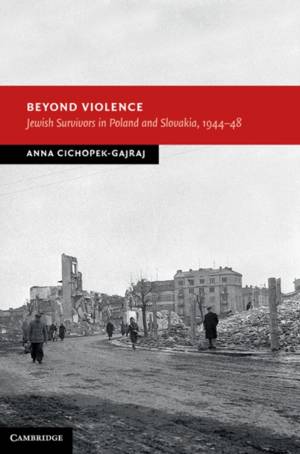
Door een staking bij bpost kan je online bestelling op dit moment iets langer onderweg zijn dan voorzien. Dringend iets nodig? Onze winkels ontvangen jou met open armen!
- Afhalen na 1 uur in een winkel met voorraad
- Gratis thuislevering in België vanaf € 30
- Ruim aanbod met 7 miljoen producten
Door een staking bij bpost kan je online bestelling op dit moment iets langer onderweg zijn dan voorzien. Dringend iets nodig? Onze winkels ontvangen jou met open armen!
- Afhalen na 1 uur in een winkel met voorraad
- Gratis thuislevering in België vanaf € 30
- Ruim aanbod met 7 miljoen producten
Zoeken
€ 172,95
+ 345 punten
Omschrijving
This book tells a story of Polish and Slovak Holocaust survivors returning to homes that no longer existed in the aftermath of the Second World War. It focuses on their daily efforts to rebuild their lives in the radically changed political and social landscape of post-war Eastern Europe. Such an analysis shifts the perspective from post-war violence and emigration to post-war reconstruction. Using a comparative approach, Anna Cichopek-Gajraj discusses survivors' journeys home, their struggles to retain citizenship and repossess property, their coping with antisemitism, and their efforts to return to 'normality'. She emphasizes the everyday communal and personal experiences of survivors in the context of their relationships with non-Jews. In essence, by focusing on the daily efforts of Polish and Slovak Jews to rebuild their lives, the author investigates the limits of belonging in Eastern Europe after the Holocaust.
Specificaties
Betrokkenen
- Auteur(s):
- Uitgeverij:
Inhoud
- Aantal bladzijden:
- 297
- Taal:
- Engels
- Reeks:
Eigenschappen
- Productcode (EAN):
- 9781107036666
- Verschijningsdatum:
- 11/08/2014
- Uitvoering:
- Hardcover
- Formaat:
- Genaaid
- Afmetingen:
- 147 mm x 229 mm
- Gewicht:
- 566 g

Alleen bij Standaard Boekhandel
+ 345 punten op je klantenkaart van Standaard Boekhandel
Beoordelingen
We publiceren alleen reviews die voldoen aan de voorwaarden voor reviews. Bekijk onze voorwaarden voor reviews.











